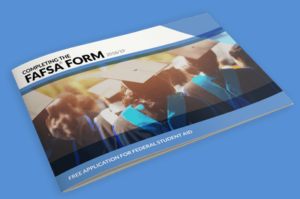 If it’s January, it’s time to file your FAFSA college financial aid application. And it’s also that time of year when I get asked if it’s worth it. There are many reasons why wealth families should apply for college financial aid as noted in a recent Wall Street Journal article.
If it’s January, it’s time to file your FAFSA college financial aid application. And it’s also that time of year when I get asked if it’s worth it. There are many reasons why wealth families should apply for college financial aid as noted in a recent Wall Street Journal article.
Many families wonder whether it’s worth the time and trouble to complete the basic college financial aid application used by the vast majority of colleges (FAFSA) or the one used by more exclusive colleges (CSS Profile). They may earn very good incomes or have lots of investments or home equity. And since the Expected Family Contribution (or EFC) for these families will be pretty high, the chances that they may qualify for needs-based financial aid is likely to be near zero. So why should these ‘wealthy’ families even bother to complete college financial aid forms?
Steve Stanganelli, CFP® , a college financial planning expert with Clear View Wealth Advisors and College Cash Pro, explained in this Wall Street Journal article that filing the financial aid forms can be a way to get benefits like merit-aid or school-specific institutional aid or be a great ‘positioning tool’ or the basis of an appeal if family circumstances change.
Financial aid forms ask lots of questions. They focus on parent income and assets as well as the student’s income and assets although each financial aid form type (FAFSA or CSS Profile) calculates the Expected Family Contribution (EFC) slightly differently. And the key to receiving ‘needs-based’ financial aid is having a low EFC.
As a college financial planner, Stanganelli encourages all clients to fill out the FAFSA regardless of income or assets. “I have yet to find an example of how it has hurt a client. Yes, it it time-consuming and for those who are not candidates for need-based aid it may seem useless,” Stanganelli has said noting that “there are a lot of reasons why wealthy families should apply for college financial aid.”
But here’s a reason why to complete it: Students will not be eligible for federal subsidized or unsubsidized loans. Even for the folks who have high incomes, there are issues about cash flow. There are times when assets to be used to pay for college are tied up and cannot be liquidated right away. Filling out the FAFSA (or Profile for that matter) means that the family can tap into a loan that is low interest (probably lower cost than taxes incurred on sale of assets).
It is also an issue about ‘values’. Parents may want to have students have some skin in the game and they do with a student loan. Parents can certainly choose to pay it off when bonus money or the sale of an asset is done later.
Also, there are campus-based programs which a family will not access if they don’t file. Even some school grants or scholarships are only available to those who actually file (even if not qualifying for need-based aid).
“Even for folks who have high incomes, there are cash flow issues,” college financial planner Steve Stanganelli, CFP® says.
Here are some examples from the case files here at College Cash Pro.
A member of the executive team of a large global firm received a large payout when the firm was bought by a pension fund. Coupled with his base six-figure salary, none of his three children would be candidates for needs-based aid. (One child in college, one about to start and the third about six years out). Most of his net worth was tied up in his home and his 401k and old retirement accounts. Most of his cash flow was being used to pay for lifestyle expenses and the $55,000+/year for his son’s college. Based on projections, his firm is on track for a buy-out in a few years that could net him a good deal of money (conservatively $1M after tax). Stanganelli advised him to file the FAFSA (and Profile if appropriate) so that the children would be eligible for college loans to help with cash-flow and to qualify for campus-based grants.
Stanganelli has another couple living in Massachusetts with a self-employed business owner and spouse who is a high-earning executive in a publicly traded firm. Most of their net worth is also tied up in their family home, business equipment and in retirement accounts. They have one daughter who is a college sophomore in a private college ($55k+/year) and another entering in Fall 2016 – a likely Ivy. The third child is about 12 years out from college. Based on income their EFC is about $90k (one of the highest I’ve ever seen). Their college funding strategy has been to use company Restricted Stock Units (RSUs) that mature each year to pay the tuition. This is workable for one daughter and possibly the second. Although not a candidate for needs-based aid, College Cash Pro again recommended filing the appropriate financial aid form to take on the federal loans. This would relieve some pressure for cash flow during the year until the RSUs mature or they can continue to hold the loans, invest the RSU money and then pay the loans off later. The interest on the federal loans is deferred.
Another reason to consider filing is the possibility that circumstances can change in between college application and paying the bill. Both of these couples could find themselves in the position that a previous client did. Due in part to the rapid pace of mergers and acquisitions last year that seems to be continuing into this year, some high-paid executives may find themselves out of a job.
This was the case for a client who was a highly paid science guy at a Big Pharma firm and found himself with a ‘reduction in force’ after a merger. His income was in the mid six-figures. He had lots of home equity (only an issue for the institutional methodology Profile schools) and lots of money tied up in IRAs and a company 401k.
After his first son was enrolled in college a while and his second son was applying, he was down-sized out of a job. Because he had filed the FAFSA he was able to go back to the respective colleges and ‘appeal for professional judgment’ which netted him additional school-based grants of about $8000 to $10,000 per year – a significant percentage of a $50,000+/year tuition/housing cost.


